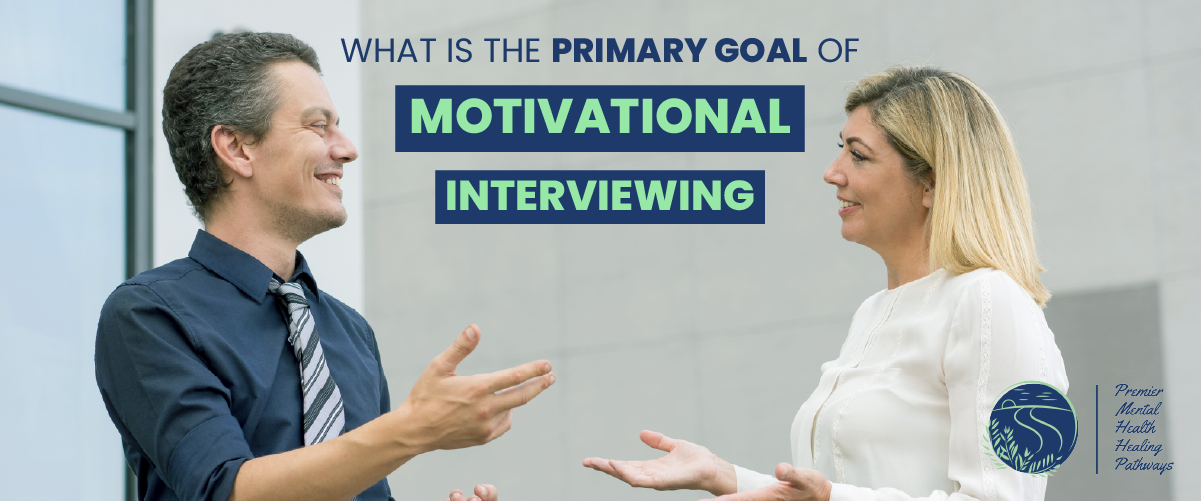What Is the Primary Goal of Motivational Interviewing?
The primary goal of Motivational Interviewing (MI) is a way of talking with people to help them find the motivation they need to change their behavior.
It’s used in different areas, like healthcare. MI is all about working together, understanding each other, and not judging.
Let’s talks about how MI helps people understand why change is important to them, how it works, and how it helps with addiction treatment.
Premier Mental Health Healing Pathways is committed to providing person-centered mental health support, strengthening individuals on their path to healthy living.
Let us explore further “what is the primary goal of motivational interviewing?”
Understanding Motivational Interviewing

Motivational Interviewing is a way of talking with people that helps them find the motivation they need to change their behavior. It is often use in healthcare, like when someone wants to quit smoking or start exercising more.
MI is all about working together, not telling someone what to do. The goal is to help people see why change is important to them and to support them as they make those changes.
Four Processes of Motivational Interviewing
The four processes of motivational interviewing are:
- Engaging
- Focusing
- Evoking
- Planning
These parts help people talk about why they might want to change, what they want to achieve, and how to make a plan to reach their goals. Motivational Interviewing wants to help people feel more confident to make important changes in their lives that last.
What Is the Primary Goal of Motivational Interviewing?
The primary goal of motivational interviewing is to help people find their reasons for change. Instead of pushing them to change, MI helps them see why change is important to them personally. This approach is based on a few key ideas:
- Collaboration: The counselor and the person work together as a team.
- Empathy: The counselor tries to understand the person’s feelings and point of view.
- Autonomy: The person is in charge of their own decisions.
- Non-Judgment: The counselor creates a safe space without judging the person.
Using Motivational Interviewing in Treating Addiction
Motivational Interviewing is often used as part of a plan to help people with addiction. Its goal is to help them figure out and overcome their mixed feelings about making good changes in their lives.
MI is usually used at the start of addiction treatment when the person is thinking about changing but is not sure yet. The therapist in MI talks with the person to understand why they want to change and what is stopping them. MI is a positive, talk-based approach that is often used during interventions.
In MI, the therapist might talk with the person about their values and goals and how their addiction is getting in the way of those.
The therapist might also help the person see their strengths and the support they have from friends, family, and doctors to help them get better.
Who Can Benefit from Motivational Interviewing?

Motivational Interviewing can help anyone struggling with addiction or substance abuse.
It is especially useful for those who are just starting treatment and are not sure if they want to change yet. MI can encourage them to make that positive change.
MI is also good for people who have tried other therapies without success. It is flexible, so the therapist can adjust it to fit each person’s needs.
The therapist and the person work together to set goals and make the therapy work for them. The primary goal of motivational interviewing is to treat each person as an individual.
This approach is also helpful for people who might not like traditional therapy or who have relapsed.
It is not confrontational or judgmental, so it can be more appealing to people who have had bad experiences with therapy or who feel like they have failed before.
And because it is client-centered, all decisions are based on what the person wants and believes.
Key Components of Motivational Interviewing
MI uses different ways to help people think about their mixed feelings and make changes. Some of these ways include:
- Expressing Empathy: Listening and understanding the person’s perspective.
- Developing Discrepancy: Helping the person see the difference between where they are and where they want to be.
- Rolling with Resistance: Not arguing with the person but trying to understand their point of view.
- Supporting Self-Efficacy: Helping the person believe in their ability to change.
In addiction treatment, Motivational Interviewing works really well. It helps people think about their mixed feelings about changing, deal with any doubts, and make a stronger decision to get better.
MI fits perfectly with the idea of caring for the person, focusing on their freedom and choice in getting better.
Benefits of Motivational Interviewing
Motivational Interviewing (MI) is a very useful and client-focused method, especially in areas like helping with addiction, mental health, and changing behavior.
MI is great because it is simple but can have a big effect on helping people change for the better.
Let us look at some of the main benefits of MI:
- Enhances Intrinsic Motivation: Helps people find motivation from within.
- Strengthens Commitment to Change: Increases the person’s determination to change.
- Reduces Resistance and Defensiveness: Makes it easier to talk about change.
- Empowers Personal Responsibility: Encourages people to take charge of their own change.
- Tailored and Flexible Approach: Can be adapted to different people and situations.
- Supports Positive Therapeutic Relationships: Builds trust between the counselor and the person.
Simply, Motivational Interviewing (MI) is more than just a technique. It is a way of thinking that helps people find their own motivation, commitment, and responsibility. It gives them power and hope for a better future.
Motivational Interviewing Activities
Motivational Interviewing (MI) is a way to help people make good changes by talking about their own reasons for change. Here are some important ways MI works:
- Open-Ended Questions: Questions that encourage people to share their thoughts.
- Affirmations: Positive statements that acknowledge the person’s efforts.
- Reflective Listening: Repeating back what the person has said.
- Summarizing: Bringing together the main points of the conversation.
- Exploring Ambivalence: Helping people talk about their mixed feelings.
- Rolling with Resistance: Understanding why someone might be hesitant.
- Developing Discrepancy: Pointing out the difference between current behavior and goals.
- Evoking Change Talk: Encouraging people to talk about how they can change.
- Supporting Self-Efficacy: Helping people believe they can change.
- Goal Setting: Working together to set achievable goals.
Motivational Interviewing is a powerful tool that can help people find the motivation they need to change. Focusing in motivational interviewing on empathy, collaboration, and personal empowerment, MI creates a supportive environment for positive change.
In conclusion, what is the primary goal of motivational interviewing?
Motivational Interviewing (MI) is a helpful way for people to make good changes in their lives. It helps them work together and understand each other. MI helps people find their reasons to change and become more committed to making those changes. This method gives people power and helps them grow and feel better about themselves.
FAQs
What is the primary goal of motivational interviewing?
The primary goal of motivational interviewing (MI) is to help individuals find their own motivation and reasons for change Instead of forcing change from outside sources.
What are the advantages of motivational interviewing?
Some advantages of motivational interviewing include enhancing intrinsic motivation, strengthening commitment to change, reducing resistance and defensiveness, strengthening personal responsibility, and supporting positive therapeutic relationships.
What are the goals of motivational interviewing?
Motivational Interviewing (MI) aims to help people understand and deal with their mixed feelings about change. It also supports them in making their own decisions and taking charge of their lives, leading to positive changes.
What is the goal of uncovering ambivalence in motivational interviewing?
The goal of finding ambivalence is to help people see if they have mixed feelings about change. By understanding and resolving these conflicting feelings, they can become more motivated to make positive changes.
How does motivational interviewing develop discrepancy?
Motivational Interviewing (MI) helps people see the difference between how they behave now and what they want or believe in. This can motivate them to make positive changes.






No comment